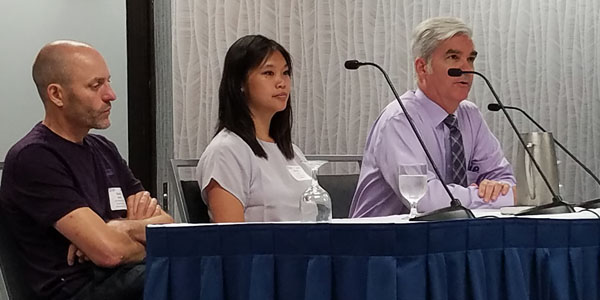
The war on cancer takes a multidisciplinary approach, and the resources at the University of Wisconsin are set up for that approach, according to a panel discussion during the monthly WIN luncheon held Tuesday at the Sheraton Hotel.
A prime example is Lynx Biosciences, which focuses on precision care for multiple myeloma and spun out of UW-Madison. It has staff members from various backgrounds, including pharmacology, biomedical engineering and biostatistics.
“Paul DeLuca and others had the foresight to build the Wisconsin Institutes for Discovery (WID), where this type of collaboration can occur,” David Beebe, a professor at UW-Madison and advisor to Lynx, said. “It really makes a difference.”
Lynx CEO Chorom Pak got her start working as a graduate student in a lab at WID. She lists WID’s proximity to UW Hospital and the Carbone Cancer Center as benefits for conducting research.
“In academia, the big area isn’t discovery, it’s taking it to the next step,” Carbone Cancer Center Director Dr. Howard Bailey said, explaining the importance of the center being close to biomedical firms such as Lynx.
Bailey also said that a typical “speed bump” to research and innovation is getting the right people together, and that is a “limited” issue at UW-Madison because of the aforementioned resources.
***
One other theme the panel discussed was the importance of data and outcomes in cancer research.
“Having the data to see what works is a game-changer,” Bailey said. “When you better know a population, most of this (technology) is going to a better value.”
Beebe said it’s because physicians will need actionable results for buy-in.
“It’s not about the technology itself,” Beebe said. “If that data doesn’t give the physician a reason to change, then why bother?”
That’s why electronic health records (EHR) are so important, Bailey said.

